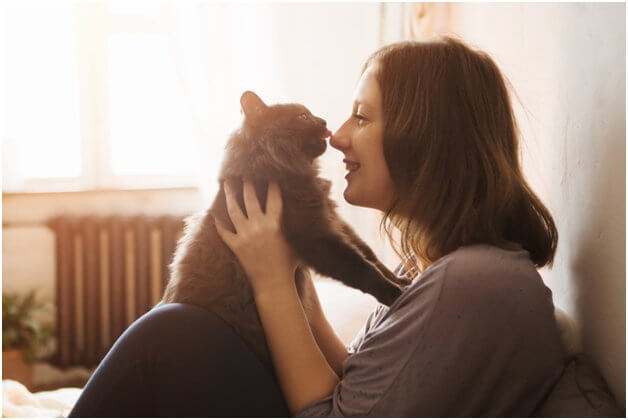The health benefits of being a pet owner have increased in number and depth. Anthrozoology is the study of human-animal interaction. Although research on the human-animal relationship is relatively new, the evidence that shows the positive impacts of pet ownership is growing. The Center for Disease Control (CDC) and National Institutes of Health (NIH) have conducted studies that show the extensive health benefits of having a cat including emotional support, improved moods, and less stress for their owners.
1. Companionship
Cats are wonderful companions to their owners. They are never-ending sources of love and friendship. Whether the cat owner lives alone, with a roommate, or with family, cats decrease the feelings of loneliness. These pet parents find happiness in their feline companions. The affection cat owners feel for their furry friends releases oxytocin, which is often called the “cuddle hormone.” Oxytocin is the hormone associated with bonding, closeness, and love.
2. Mental and emotional health
Cats offer support when it comes to day-to-day stressors. Interacting with a cat leads to a notable decrease in levels of cortisol, a stress hormone. Oxytocin counteracts the effects of stress on the body and mind. Cats can act as emotional support for people suffering from mental illnesses like anxiety, depression, and Post-Traumatic Stress Disorder (PTSD). Cats help elevate stress, improve outlook, and limit the number and severity of mental illness flare-ups. It is necessary for cat owners to implement and maintain a routine for the furry companion. These routines can help owners manage their mental illness. Overall, cat owners have a decreased risk of depression and other mental illnesses.
3. Lowers the risk of stroke and heart attack
Various studies have found a connection between having a cat and improved cardiovascular health. Cat owners tend to have lower resting heart rates, lower blood pressures, and low levels of cholesterol and triglycerides. All of these combined means a significantly lower risk for heart disease, stroke, and heart attack. The CDC found that cat owners are 30 percent less likely to have a heart attack and 40 percent less likely to have a stroke. Cats can aid in the recovery process of a patient who has suffered a heart attack or stroke, as well.
4. Healing the sick and easing pain
Any pets can aid in reducing the symptoms of pre-existing conditions and chronic illnesses. A cat’s company can reduce anxiety which then reduces the pain of the patient. Cats have been shown to help patients with asthma, Alzheimer’s, dementia, obesity, autism, cardiovascular disease, auto-immune diseases, and more. Along with the reassuring company, a cat’s purr has soothing effects. New studies have shown how a cat’s purr, which has a frequency of 20 to 140 HZ, can help calm nerves, lower blood pressure, and increase joint mobility after an injury.
5. Prevents allergies and Improves Immunity
Children have a decreased risk of developing allergies as they get older when they grow up in a home with a cat. The likelihood of developing allergies to cats and dogs decreases with exposure to those animals at a young age. Children also have a lower risk for allergies to dust mites, ragweed, and grass. Children have strengthened immune systems and get fewer ear infections and respiratory problems. Since these children get sick less, they miss fewer days of school.
For people of all ages, there is a correlation between owning a cat and a better immune system. High levels of stress jeopardize immune systems. Interacting with cats can reduce peoples’ stress thus improving their overall health and wellness.
6. Helps people socialize
Cats help promote socialization among young children, older adults, and physically or mentally disabled people. There are many proven benefits of growing up in a household with any type of pet. For example, children learn to express themselves in more ways and can relate better to other children, which furthers emotional development. A survey reported that 75 percent of children ages ten to 14 seek the comfort of their pets when they are upset. Children with autism and Attention Deficit Hyperactivity Disorder (ADHD) have shown behavior improvements when interacting with an animal regularly. They have improved focus, less self-absorption, and fewer repetitive behaviors.
A pet companion is beneficial in mourning the loss of a loved one, especially for the elderly. Those who care for cats tend to take better care of themselves. They are more capable of preparing meals, bathing and dressing, and taking medication. The company of a cat combats loneliness, which has links to many diseases.

Leave a Reply